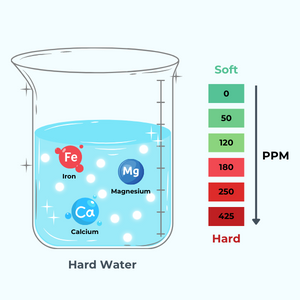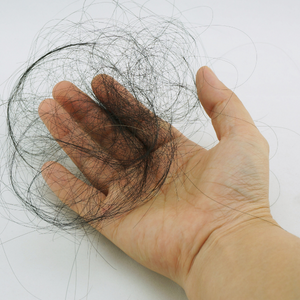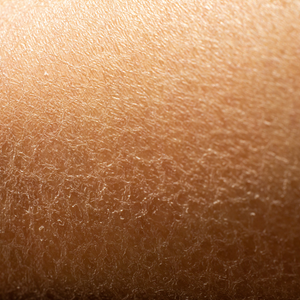Table of Contents
What is Hard Water?
Hard water is a term that frequently pops up during discussions about water quality. But what exactly is hard water, why does it matter and how to treat hard water at home?
Water that contains a high concentration of minerals, primarily Magnesium and Calcium ions is called hard water.
How is hard water measured?

The hardness of water is typically measured in parts per million (ppm) or grains per gallon (gpg), with higher values indicating harder water. Here’s a rough classification-
- Soft Water: 0-60 ppm (or 0-3.5 gpg)
- Moderately Hard Water: 61-120 ppm (or 3.5-7 gpg)
- Hard Water: 121-180 ppm (or 7-10.5 gpg)
- Very Hard Water: Over 180 ppm (or 10.5 gpg)
Effects of hard water
-
Hair fall
Hard water's impact on hair can extend to hair fall or hair loss. The mineral build up on the scalp can weaken hair roots, leading to breakage and excessive hair shedding. It makes it difficult to rinse out shampoos and conditioners completely. This can lead to a dull appearance, hair breakage, and hair fall.

-
Dry Skin
Hard water can leave a residue on your skin, making it challenging to rinse off soap and cleansers effectively. This can lead to dryness and skin irritation, especially for people with sensitive skin.

-
Limescale Deposits
Hard water contains high levels of Magnesium and Calcium ions. These minerals leave deposits known as limescale on tiles, mirrors, faucets, showerheads, and appliances water heaters and washing machines. Over time, these deposits can clog fixtures, reduce water flow, and decrease the efficiency of appliances.

-
Reduced Lifespan of Appliances
Hard water can cause scale build-up inside appliances like dishwashers, washing machines, and coffee makers. This can lead to increased energy consumption and potentially cause premature appliance failure.

How to remove hardness of water?
Treating hard water at home involves various methods to reduce the effects of water hardness and minimise its impact. Here are a few methods:
- Use hard water conditioning shower and tap filters: Investing in showerheads and taps that are designed with built-in hard water conditioning technology will provide you with cleaner water, reducing the impact of hard water on your hair and skin during showers. This will result in reduced hair fall and better skin.
- Install a water softener: One of the most effective and common ways to treat hard water. They work by exchanging Magnesium and Calcium ions in the water with sodium or potassium ions, effectively softening the water.
- Regular cleaning and maintenance: Using hard water stain cleaning detergents and formulas can help improve cleaning efficiency. Clean tiles, tap faucets, showerheads, and other fixtures regularly to prevent limescale build-up.
- Install appliance filers: Using a washing machine filter can indeed help increase the lifespan of your appliances like washing machines, dishwashers etc. by mitigating the damaging effects of hard water.
Before purchasing any water treatment system, consider having your water tested to determine the hardness level and consult with a professional to choose the most suitable option for your specific needs.





